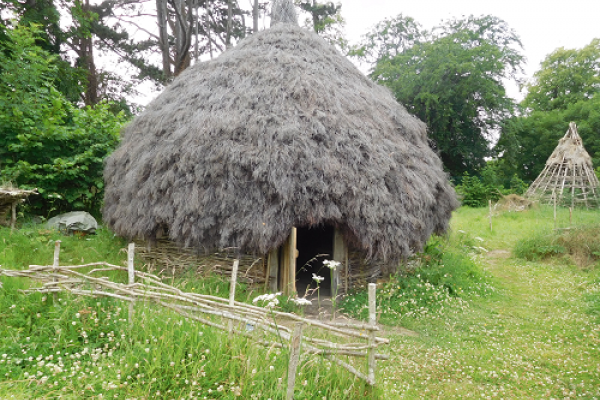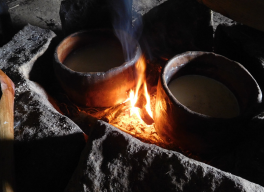
The Center for Medieval and Renaissance Studies cordially invites you to attend the third lecture of our 2020-2021 lecture series.
This event, as with all the lectures in our annual series, is free and open to the public!
You can watch a recording of this event on our Mediasite.
Abstract:
Experimental archaeology can be defined as the (re)construction of past buildings, technologies, environmental contexts, and things, based on archaeological evidence, and their use, testing and recording as analogies, to create a better understanding of people's lives in the past, and their relationships with buildings, things and material culture. Experimental archaeology has been a part of the archaeological discipline since its origins, the earliest antiquarians often carrying out practical experiments with ancient tools to discern their use. It boomed again in the 1960s and 1970s, as part of the interest in archaeology in seeking scientific, replicable results to understand past technologies. In recent years, some have wondered if it is possible to have an experimental archaeology that is

both ‘knowledge-focused’ and ‘experience-oriented’, and if we can give more weight to experience, or the sensory and emotional aspects of how people engage with material culture? Can we think about the “phenomenology of objects, the ‘feel of things’, the experience of buildings? This lecture will explore the research projects, undergraduate and graduate teaching, and public engagement activities of a university facility for experimental archaeology at University College Dublin. Through case studies of our own reconstruction of early medieval buildings, objects and technologies, we will investigate the many different ways that "making" helps with "understanding", and how "storytelling" about the past can engage with both archaeological and historical evidence, but also with our own experiences.
Attendees might be interested in exploring the work of CEAMC through the link below.
UCD Centre for Experimental Archaeology and Material Culture
Bios: Brendan O'Neill is an Assistant Professor in the School of Archaeology. He was appointed in the summer of 2018 to develop and enhance teaching and research in Experimental Archaeology and Material Culture. He is a module coordinator on undergraduate and graduate level Experimental Archaeology modules as well as a Masters level module exploring Material Culture. Added to these he contributes to a number of other modules with individual formal lectures, workshops and hands-on, practical content. His teaching approach is heavily influenced by Active/Experiential Learning techniques, providing students with well rooted, deep learning on a range of topics. He is also very much focused on providing different and dynamic learning environments, providing a wide range of access points to education for students. Since 2013 he has been the Deputy Director of UCD's Centre for Experimental Archaeology and Material Culture (CEAMC). In this role he is responsible for coordinating the strategy and day-to-day running of CEAMC, generating and disseminating research and managing its outreach activities. He is also responsible for site space management, Health and Safety and Material procurement.
Aidan O'Sullivan is a Professor in UCD School of Archaeology. He was appointed to UCD as a College Lecturer in September 2000, promoted to Senior Lecturer in 2005 and to an Associate Professorship in 2014. He has been Head of UCD School of Archaeology (2012/2013) and is currently and has been previously Deputy Head of School (2011-2014, 2016-2019). He was elected a Member of the Royal Irish Academy (MRIA) in 2017, and is a Member of the Institute of Archaeologists of Ireland (MIAI), and was elected a Fellow of the Society of Antiquaries (FSA), London. Academic awards include an IRCHSS Senior Research Scholarship in 2002-2003, a UCD President's Research Fellowship in 2004-2005 and he was an invited Visiting Professor at Le Centre national de la recherche scientifique (CNRS) at the University of Rennes I, France in May 2010. His research is focused on three principal areas: early medieval Ireland in its northwest European context, wetland archaeology and environments across the world, and experimental archaeology and material culture.
If you require an accommodation such as live captioning or interpretation to participate in this event, please contact cmrs@osu.edu. Requests made by about 10 days before the event will generally allow us to provide seamless access, but the university will make every effort to meet requests made after this date.
